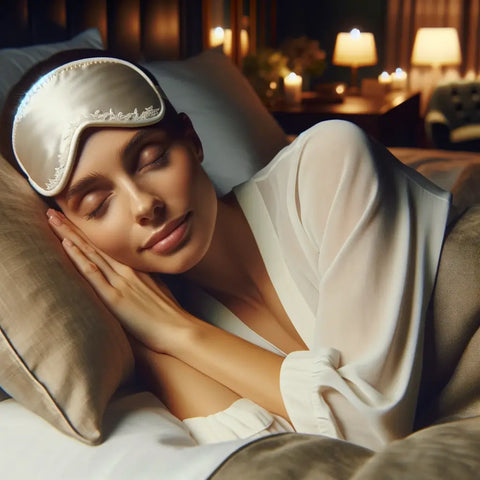Unlocking Restful Nights: The Wonders of Sleeping with a Mask
In our never-ending quest for a blissful night's sleep, we often explore various gadgets and practices, ranging from the traditional to the technologically advanced. Among these, sleeping masks emerge as a surprisingly simple yet profoundly effective tool. But, as with any sleep aid, questions about its safety and efficacy often arise: "Is it safe to sleep with a mask on?" and "Can you sleep with a face mask on?" Let's dive into the world of sleeping masks, shedding light on their benefits and addressing these common concerns.
The Serenity of Darkness: Embracing the Night
Sleeping masks, also known as eye masks, are designed to block out unwanted light, creating a personal night environment irrespective of the surroundings. This darkness is not merely for comfort; it plays a critical role in signaling your body that it's time to rest. Melatonin, the hormone responsible for regulating sleep-wake cycles, thrives in darkness. By wearing a mask, you potentially enhance your body's natural melatonin production, paving the way for a quicker and deeper sleep.
Is It Safe to Sleep with a Mask On?
Safety is a paramount concern, especially when it involves our sleep. The good news is, sleeping with a mask is considered safe for most people. However, the key is choosing the right type of mask. A well-fitted, breathable, and comfortable mask can be a boon for your sleep without causing any adverse effects. It's crucial to opt for masks made from soft, breathable materials to ensure adequate air circulation and to prevent any discomfort or irritation.
Can You Sleep with a Face Mask On?
When we expand the discussion to face masks, such as those designed for skincare, the context slightly changes. While sleeping with an eye mask is universally beneficial, sleeping with a skincare face mask on can depend on the type of mask and your skin's sensitivity. Overnight masks designed specifically for sleep are generally safe and can hydrate and repair the skin throughout the night. However, using clay masks or other types designed for short-term use can lead to skin irritation or dryness. Always check the product's instructions and, if in doubt, consult with a skincare professional.
The Multifaceted Benefits of Sleeping Masks
Beyond the direct benefit of promoting sleep through darkness, sleeping masks can offer several other advantages:
- Enhanced Sleep Quality: By blocking out light, masks help maintain the depth of your sleep, reducing the chances of mid-sleep awakenings.
- Portability and Convenience: Unlike blackout curtains or other light-blocking solutions, a sleeping mask is a cost-effective and highly portable alternative. It's a traveler's best friend, ensuring restful sleep anywhere, from airplanes to brightly lit rooms.
- Reduced Eye Strain: For those sensitive to light, wearing a mask can help alleviate the pressure on the eyes, providing a soothing effect that compliments the journey to sleep.
Choosing the Right Mask
With a plethora of options available, selecting the right mask is crucial. Look for masks that contour to your face shape, ensuring no light seeps through. The material should be gentle on your skin and easy to clean, with an adjustable strap to avoid too much pressure on your head.
Conclusion
Sleeping masks stand out as a testament to the adage that sometimes, the simplest solutions are the most effective. Safe for use by the majority, they cater not only to our quest for uninterrupted darkness but also to our skin's needs, provided the right type of mask is used. Whether you're seeking to enhance your sleep quality or provide your skin with overnight nourishment, incorporating a sleeping mask into your nightly routine could unlock the door to restful, rejuvenating nights. Always remember, the right preparation can turn sleep from a mere necessity into a nightly luxury.
Get your sleeping mask from clicking here today!
